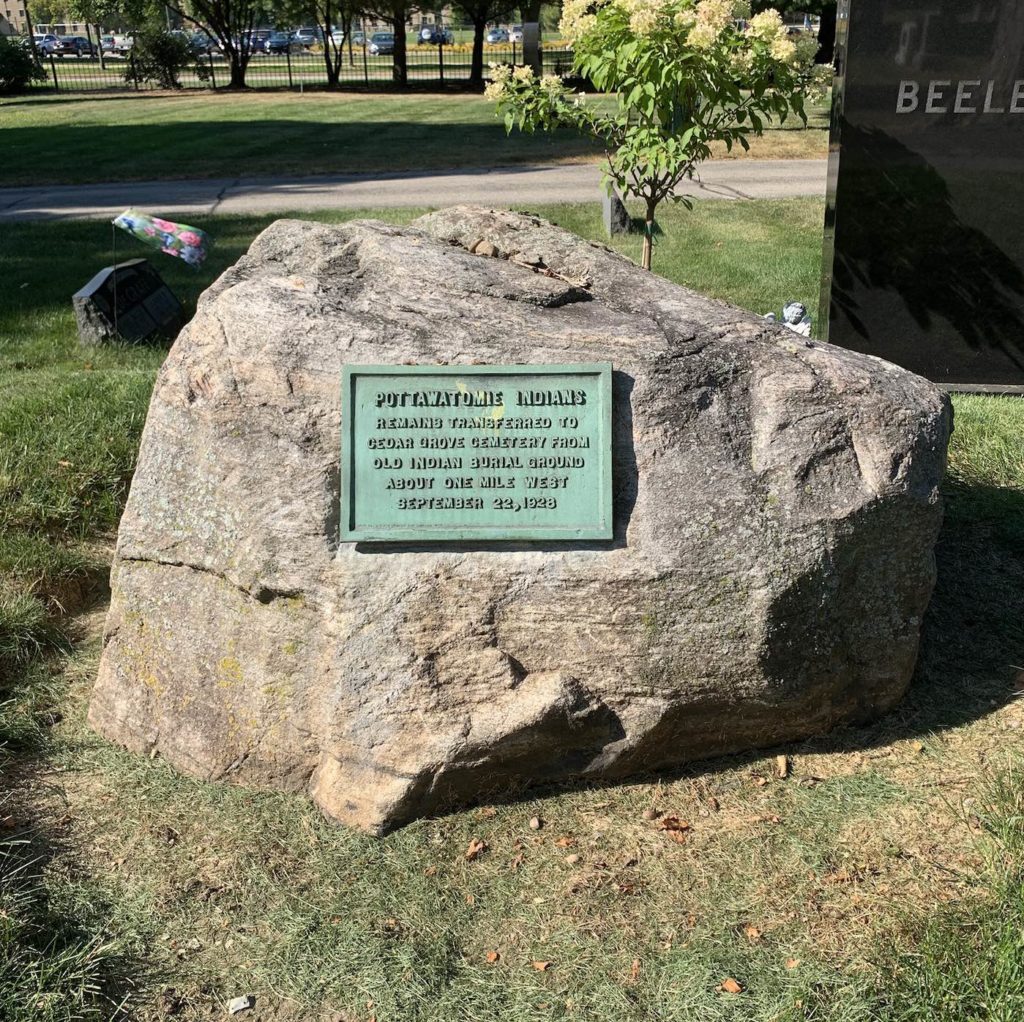Introduction
On a cold grey South Bend afternoon, a group of twenty or so Notre Dame students track their way among blowing leaves and frozen mud through Cedar Grove Cemetery, stopping alongside a service road snaking through the tombstones. In front of them lies a squat boulder no taller than three feet, crowded in on all sides by more contemporary markers bearing family names of European origin. A placard embedded in the boulder reads:
POTTAWATOMIE INDIANS
REMAINS TRANSFERRED TO
CEDAR GROVE CEMETERY FROM
OLD INDIAN BURIAL GROUND
ABOUT ONE MILE WEST
SEPTEMBER 22, 1928
The burial ground in question was a sacred resting place along the Senathëwen Zibé, today called the St. Joseph River, for Bodéwadmik who had passed on. Little is known about the identities of the people whose bodies now rest in Cedar Grove, and little is known about the decision to exhume and transfer them. Perhaps those who discovered them while digging believed them to be Catholic converts of the Pokégnek Bodéwadmik and justified their interment at a Catholic cemetery using such reasoning. Those curious to know more, however, are hard-pressed to find any documentation of this memorial; it appears in no official Notre Dame media and little verifiable information is available to the public.

On this cold grey afternoon, a class has gathered to listen to their professor recount the story of this marker, the people it memorializes, and the utmost importance of remembering and paying tribute to the Bodéwadmik ancestors through gifts. After a short discussion about who is expected to pay tribute, how, and why, the students leave an offering of tobacco at the memorial and part ways. It is a brief but profound encounter.
The memory of these Bodéwadmik people, their lives, and their post-mortem journey lies precariously in the hands of a single professor and his class. With no institutionalized effort to preserve or even acknowledge the existence of this memorial and the people it commemorates, the ritual remembrance of Bodéwadmik ancestors from this land is dangerously close to disappearing, taking with it one of many unhealed scars left by European colonizers in their conquest of this land and its peoples.
The memory of these Bodéwadmik people, their lives, and their post-mortem journey lies precariously in the hands of a single professor and his class.
This memorial and its history encapsulates the larger crisis of the University of Notre Dame’s selective bias in recalling its own history. It represents the feeble historicization within University culture of Indigenous peoples as a monolithic, dying culture of the past. More broadly, it represents an unwillingness to honestly and critically engage the University’s own complicity in the complicated and violent history of European colonization through evangelization. For too long the University has defined its story as one of unequivocal success in the face of adversity: a triumph of moral righteousness amidst a world of pain, a tale of white saviorism that today nobly marches forward. We aim to change that with our new initiative, Accomplice.
Accomplice is a decolonial journal seeking to foster consequential dialogue about the history of the University of Notre Dame with special emphasis on the relationships between the University, greater South Bend, and the Indigenous nations on whose land we teach, learn and work. Our vision is to cultivate a space where there is the acknowledgement and peace necessary for discussion, debate, and institutional transformation. We do not begin with a question of whether the University of Notre Dame has acted as a colonial institution, but rather how: how have white, Eurocentric, privileged, heterosexual norms been enforced and institutionalized by the University, and how might we challenge that institutionalization with a radical re-conception of what the University ought to be? As an essential part of this, we ask how the University might strengthen its relationships through reparations, which are an essential part of transforming the structures supporting hegemonic powers and structures.
Central to Accomplice is an understanding that, as a Catholic university, Notre Dame bears a moral obligation to honestly call to mind the transgressions of the institution and struggle towards a more just future in which all are welcomed and treated as God’s beloved. To that end, we are working to engage representatives of the institution—administrators, government officials, etc.—and grassroots activists, student organizations, and all those who represent varied and nuanced sides within ongoing struggles for justice. Our hope is to build coalitions that together work to dismantle systems of oppression embedded within the University.
We must go beyond discussion and debate: Accomplice seeks to invigorate movements with material consequences for hegemonic institutions and transform the lived experiences of the historically marginalized. We may not necessarily agree with every opinion, argument, or call belief we publish, but we do believe each contribution we share highlights important perspectives in the common pursuit of justice for all.
We are not here to speak on behalf of any community or person, but rather to uplift and amplify in one space the many voices and efforts already engaging these complicated issues. We will publish essays, film, art, creative writing, interviews, transcripts, proposals, articles, and much more. Unlike traditional print journals, we use our stories to reimagine the world around us, locating each contribution we receive on a map of the University campus and surrounding area, sharing an ethos with the landback movement. In this way, we see the world not through preconceived and unjustly-defined borders, but through transcending stories that document both unity and division with the hope of bringing about lasting peace and transformational change.
We must go beyond discussion and debate: Accomplice seeks to invigorate movements with material consequences for hegemonic institutions and transform the lived experiences of the historically marginalized.
What does this change look like? The short answer is that we don’t yet know. For every issue we examine there are innumerable potential solutions, and rarely are two issues resolved through the exact same means. That is why we rely on you, readers of and contributors to Accomplice, to engage our work with your own ideas. Learn about the questions and initiatives we share, dare to imagine how our community can work together to support those working for change, and together we will realize a more equitable and just community that values the dignity of all.
We believe that changing our relationship to this place is an essential first step in the process of material reparations for Black, Indigenous, Latinx, and queer communities at Notre Dame and in greater South Bend. In promoting a biased, doctored history of the University, Notre Dame has avoided acknowledging the need for reparations and institutional revisions for too long. Failure to understand our history has resulted in failure to create a just campus for all. The inability to acknowledge the University’s hand in colonizing the Pokégnek Bodéwadmik has allowed colonial structures to persist and thrive through the University’s present-day operations, encroaching upon facets of campus life far removed from the relatively ancient history of the University’s founding. Through engagement with the campus community—which by now includes individuals far beyond the edges of the University’s physical campus—we at Accomplice want to end this cycle.
The road ahead for Accomplice is likely long. The changes we want do not happen overnight. To that end, we have established this journal as a tool to outlast us, the project team that writes to you today. We hope to sustain future generations of activists, scholars, archivists, and all those interested in engaging the questions we pose in their own time. Thanks to the Kroc Institute for International Peace Studies and CurateND (an initiative of the Hesburgh Library), all contributions to Accomplice will be archived for posterity, and our website is designed with accessibility, malleability, and growth in mind. When it comes time to pass our work to the next generation, we will hand them a foundation on which they can build: the knowledge and lessons we impart today, and the visions and hopes we hold for the future of our community.
-Fiana Arbab & Liam Maher

